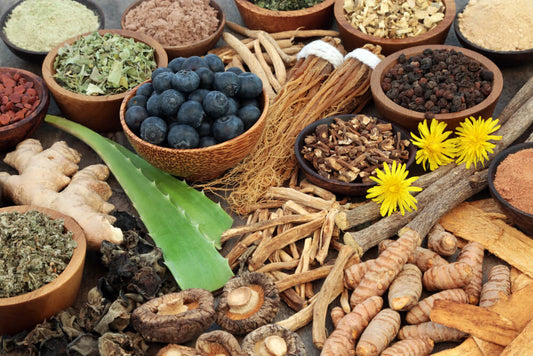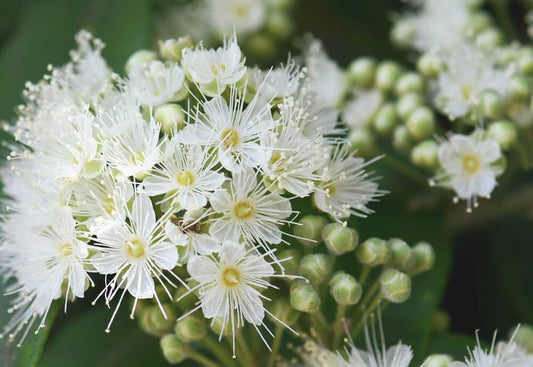
Adaptogens: Your Answer To Stress
Adaptogenic herbs have been creating quite a buzz in the health and wellness world, and for good reason too. Promoted to help our bodies respond better to stress, these plants sound like they may possess magical properties.
What if the stories are real, and adaptogens DO help our body’s adaptability to stress? Are these herbs worth including in our diet? Let’s start with the basics and learn a little bit about what an adaptogen actually is.
What Are Adaptogens?
Adaptogens are herbs that are supposed to help the body handle stress better. These non-toxic supplements have been used for centuries in Eastern Medicine -- particularly in Chinese and Ayurvedic healing traditions. The fact that these plants have been in use for many years is a testament to its health properties.
The word “adaptogen” was recently coined by Russian toxicologist Nikolay Lazarev in the 1950s. He believed that certain herbs could assist the body’s response to stress, specifically letting the body “adapt” to a range of stressors.
Stress comes in all forms, shapes, and sizes. Whether it’s a colleague at work, the alarm that jolts you to wake up every morning, or the long commute home, our bodies are wired to react to different stressors.
The body’s natural response to stress comes in three stages:
Alarm: When our bodies decide that something is causing stress, the initial reaction is to be alarmed. This is what triggers the “fight- or-flight” response and our bodies undergo a host of physical changes:
● Heart rate increases
● Blood pressure increases
● Blood sugar (i.e. glucose) levels rise
● Respiration rate increases
● Muscles tense up
● Perspiration increases
● Pupils dilate
Resistance: As long the body believes that the stressor is still present, it will still react to it. The body begins to work in overdrive, increasing metabolic levels in order for it to offset the stress.
Exhaustion: Our bodies aren’t machines, and there will come a time where it will reach its breaking point. When it does, the immune system is suppressed and we may develop diseases and health conditions such as depression, cardiovascular disease, and diabetes.
The real kicker is that even if we experience eustress (positive stress) or distress (negative stress), the body undergoes these 3 stages.
Knowing now that stress can trigger these reactions, helping our bodies manage stress is one of the wisest things we can do early on. The buildup of stress is hazardous and to a degree, life-threatening.
Common Adaptogens
Maca Root
The maca root is part of traditional South American medicine. Warriors were said to consume maca root before heading out to battle. The root is said to boost energy levels, enhance vigor, and improve strength. It is also rich in beneficial polyphenols.
Chaga Mushroom
The chaga mushroom grows on the side of birch trees and does not look like your ordinary mushroom. However, go beyond its unusual appearance and you’ll discover that it is a minefield of nutrients and antioxidants. The chaga mushroom is considered a “super mushroom” because it is nutritionally dense -- it ranks high in the Oxygen Radical Absorbent Capacity (ORAC) test. The ORAC determines a food’s antioxidant capacity and the chaga mushroom ranks better than acai and blueberries.
You can learn more about the benefits of chaga mushroom here.
Reishi Mushroom
Reishi mushrooms can help your body create a more restful and healthy sleeping pattern, as well as help bring peace and relaxation to your mind and body. Reishi mushroom is revered to be an “elixir of immortality” in Eastern medicine because of its high level of antioxidants.
Cordyceps Mushroom
The boosting power of cordyceps on the body’s immune system has been observed in some preliminary studies. The results are very promising and it gives us all the more reason to include cordyceps mushroom into our diets. Cordyceps targets the body’s natural reaction to stress, which could include inflammation. Helping the reduction of inflammation can lessen the chances
of developing certain diseases and health conditions. Read more about the health benefits of cordyceps here.
Turmeric
Like cordyceps, turmeric is said to be an anti-inflammatory supplement. Inflammation is a natural reaction to something like a viral attack or when the body detects foreign invaders within itself. This inflammation helps keep bacteria at bay, attacking only when necessary. However, when our body is in constant stress, the immune system gets “confused” and may start targeting healthy cells. Turmeric may help with the body’s immune system coping mechanism under stress.
Adding Adaptogens To Your Diet
Adaptogens generally work the same way - improving your body’s response to stress - but certain adaptogens may bring about a specialised effect. For example, take turmeric if you want to improve brain function and help lessen symptoms of depression, or cordyceps if you want a boost in stamina.
Most adaptogens come in powder or capsule form. This makes it easier to incorporate to your favourite smoothie or fruit bowl. Capsules provide convenience; you don’t need to worry about missing a dosage. Be creative in the kitchen!
Remember that adaptogens aren’t meant to cure or treat any disease; these should be incorporated into a healthy diet. It would also be most helpful to also learn how to cope with stress better, such as meditating or starting a simple exercise routine.
Superfoods Australia’s wide range of products including adaptogens, all of which are mentioned in this post. We only provide organic and ethically-sourced food supplements to our clients.













